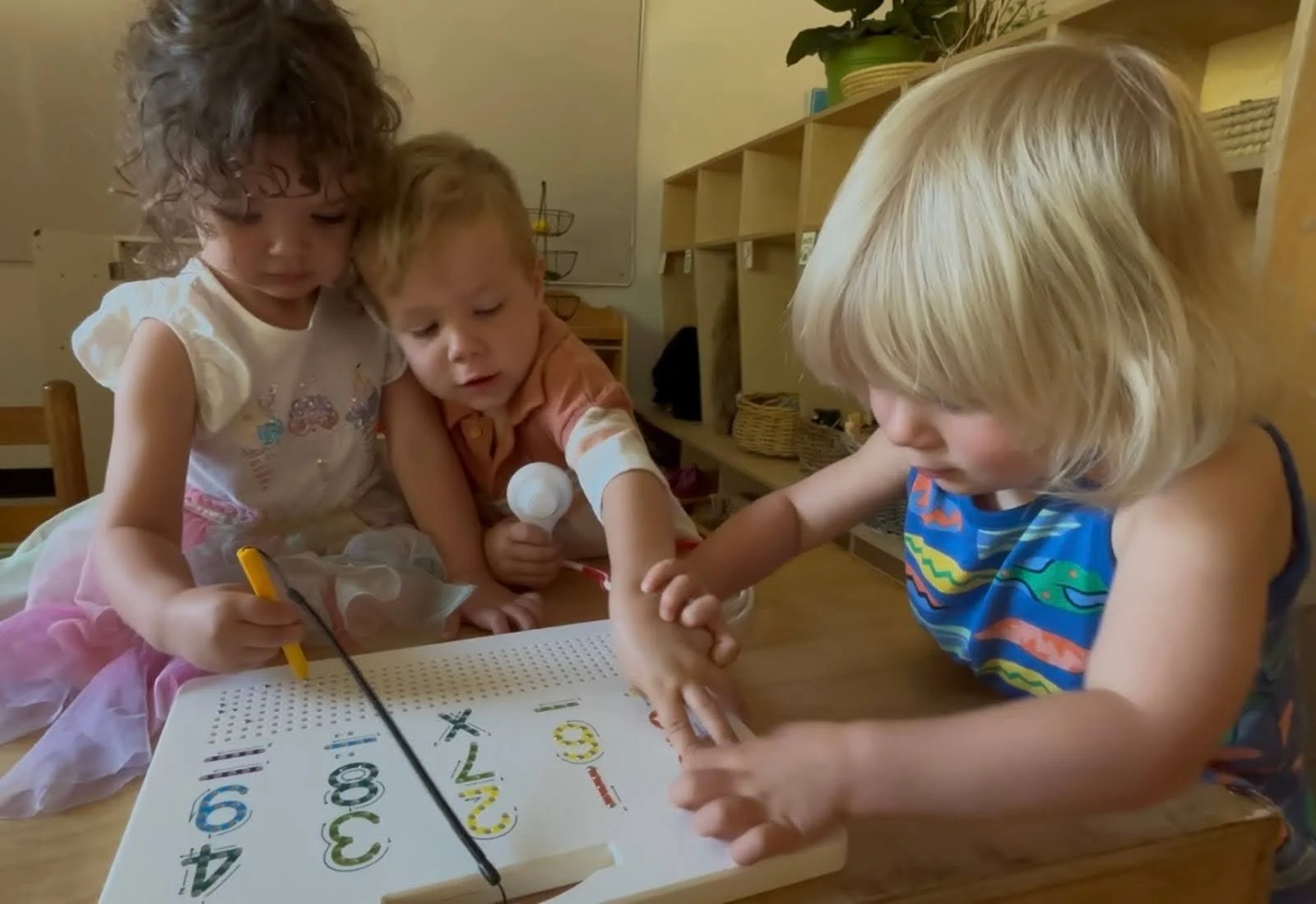Play in the Power Primes
In 1932, sociologist and researcher Mildred Parten published a landmark study detailing the ways in which children participate and behave both individually and in groups. These observations led her to distinguish six different types of social participation, or play: Unoccupied behavior, onlooker, solitary independent play, parallel activity, associative play, and cooperative play. In each of these stages, children develop and practice the necessary skills to support a future of problem solving, collaboration, creativity and social-emotional growth.
The two- and three-year-olds in the Power Primes classroom are working every day on the last three stages of play, which are classified as the more sociable forms. In parallel activity, children play independently but alongside other children. Often they use similar toys, but without direct interaction. In associative play, children play together with other children. They talk about the activity they are all involved in together, but the activity is not organized around a shared goal and each child acts as they wish. Lastly, in cooperative play, there is more organization. One or more children take lead, sharing goals. This stage involves a high level of cooperation and communication.
As early childhood educators, Tayler and I play a critical role in supporting our group's path towards successful collaborative play. Our approach begins with careful observation, documentation of what we see happening, analysis of the documentation, and plans for moving forward with appropriate scaffolds in place.
Mae and Charlie are adding dirt to the red pot, when Jack comes over and lifts it up.They all start to pull on it in different directions, saying, “Hey! Stop! Stop!”
Sammy is filling up his blue pitcher with dirt. Mae comes over and starts to try to add dirt, too. He moves his body so it’s hard for her to reach, yelling, “No! I’m using it!” But she persists.
Daicey and Jack are both wanting to sit in the lead spot on the fallen down log. “Ugh! Jack’s trying to hold right here.”
Harper waits to have a turn with the magnet board after Mae. Bode comes over, saying, “My turn now!” and begins pressing some of the magnetic balls down. Harper tries to remove his hand saying, “No! No! Ow!”
What we have learned during the first few weeks of school is that the Power Primes are an incredible group of children who already care a great deal about each other. When they arrive at school, they look out the window with elation as each friend approaches the building. They laugh and snuggle and hug each other and also many of their interactions at school involve some kind of conflict. When we sit down for snack in the morning it's not uncommon to hear two children arguing about what they have that day. One child will exclaim, “I have apples!” and a peer will say, “No! I have apples.” It continues on: “No, me!” “No, I do!” until we intervene and point out that it’s possible for them to both have apples, and when someone has apples and you also have apples you can say, “Me too!” because it’s a thing you have in common. The need for this scaffolding makes sense, since two- and three-year-olds are naturally very egocentric. It’s hard to imagine an experience outside of their own, but as they enter the associative play stage, they begin to turn their focus from themselves to other children and their activities. We welcome these conflicts as developmentally appropriate opportunities to practice communication, problem solving, perspective taking, creativity, and social confidence—-skills they will carry with them for the rest of their lives.
For me, the exciting part of teaching this age is thinking creatively about the ways I can scaffold their learning to develop crucial social skills like communication, negotiation, and sharing-–the necessary foundation for more advanced cooperative play. Some ideas that have come out of our observations so far include:
Providing supportive scripts for sharing, such as “Can I have that when you’re done?”
Modeling what it looks like to communicate your plan, your desires, your feelings. Creating opportunities for small groups intentionally designed with mixed ages so the children can model for each other.
Harper stands on the periphery of some older Adventure Primes children making soup. The goal is clear and individual roles are adopted by each player (collecting certain ingredients, mashing them into the pot). Harper watches in amazement for five minutes without looking away.
Thinking carefully about the role the environment plays in their success.
Following an interest in trains and trips on trains, we set up a train with enough spots for every person. We projected a train track on the wall to assist in an obvious shared goal.
Minimize materials that are one-of-a-kind and focus on open-ended materials in order to limit the amount of negotiation that needs to take place.
This moment on Friday afternoon in the sandbox felt like a beautiful example of growth for some Power Primes. The open-ended nature of sand allowed them to congregate in a space where they could work on their own ideas and also negotiate some materials. There was communication about feelings, problem solving, and questions that led to successful sharing.
Sammy: I’m making some dirt in here.
Ezra: I’m using a shovel, but I can’t find it.
Marlow: I’ll get you another shovel Ezra.
Charlie: (talking to Ezra about the trash truck) Can I have it, please? Can I use it? Can I have it?
Ezra: I’m using it.
Marlow: I’m filling up this truck.
Owen: I’m digging a road. Trying to make a flat road. I’m trying to dig for dino bones.
Jack: Hey! You’re getting my leg all dirty. I don’t like that.
Ezra: (Charlie takes the garbage truck) Hey, my garbage truck! Maybe Charlie’s not playing with it, but maybe Charlie is looking at it? Charlie, can I have that back after you?
Charlie: Yeah.
Jack: I’m mowing this down.
Marlow: (To Jack) Can I have that after you?
Jack: No.
Marlow: Why?
Jack: ‘Cause I’m going to use it for a long time.
Val: That's okay–have a long turn, but what about when you’re all done?
Jack: Yeah.
Sammy: (To Ezra) Can I use that when you’re done?
Ezra: No.
Sammy: He said no!
Val: Hmm, try again. Say, "Can I use it when you feel finished?"
Sammy: Can I use it when you’re finished?
Ezra: Sure.
Sammy: He said sure!
“Play is often talked about as if it were a relief from serious learning. But for children play is serious learning. Play is really the work of childhood.” -Fred Rogers
Parten, M. B. (1932). Social participation among pre-school children. The Journal of Abnormal and Social Psychology, 27(3), 243–269.







